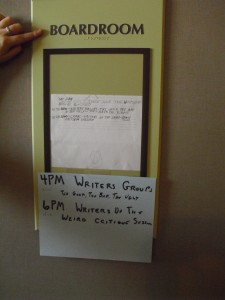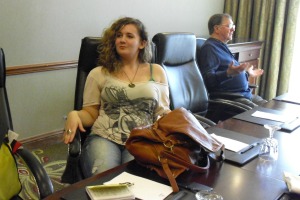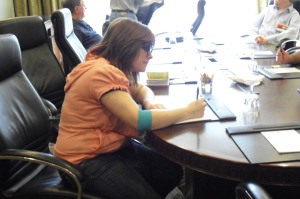 Several weeks ago at Lunacon, Kaitlyn and I learned many things; but nowhere did we learn in a classier setting than at one of the con’s new “un-conference” sessions. In order to accommodate the wide variety of interests of con-goers, there were a handful of panels throughout the weekend left empty. Blank sign-up sheets were left outside of the room, and the subject was determined on a first-come-first serve basis. Neither Kaitlyn nor I had ever seen anything like this before, and we were highly intrigued.
Several weeks ago at Lunacon, Kaitlyn and I learned many things; but nowhere did we learn in a classier setting than at one of the con’s new “un-conference” sessions. In order to accommodate the wide variety of interests of con-goers, there were a handful of panels throughout the weekend left empty. Blank sign-up sheets were left outside of the room, and the subject was determined on a first-come-first serve basis. Neither Kaitlyn nor I had ever seen anything like this before, and we were highly intrigued.

Kaitlyn’s Classy Pose
Somehow, we managed to stumble upon a highly relevant panel for the both of us, on the topic of Writer’s Groups: The Good, the Bad and the Ugly. For those of you non-writerly folks out there, you may be interested to know that we are a mostly solitary people, choosing to brood in the dusty corners of coffee shops and libraries, awaiting a Very Specific Plague in which every other person who would otherwise come into contact with us has suddenly been moved elsewhere. Unless, of course, that other person is also of a writerly persuasion, in which case we will feverishly compare latest projects and blog addresses.
This particular panel was all about how to skip the brooding and plague-wishing and move on to the part where we find the Others–a process made all the quicker by Writer’s Groups. Representatives were on hand from “Writers of the Weird” and “Science Fiction Writers of America“(SFWA), as well as advocates for the online writers group websites such as Critters. The panel not only listed sites like these and many others, but, as the title suggests, opened up discussion for how writers groups work and what to do when they don’t.

Jen taking classy notes.
My previous joke about writers being solitary creatures is mostly true, however we do like to discuss our craft and writers groups provide a perfect opportunity for that. Not only do groups offer space for discussion, in the best of cases they can also offer peer editing, support systems, and an overview of the current market. Sometimes, writer’s groups can serve as griping sessions or a place to figure out a better balance between your (lets face it) Real Job and your writing time. As it turns out, we are a fiercely loyal people who, for the most part, has each other’s backs. The speakers even mentioned a handful of websites devoted entirely to revealing phony calls for manuscripts and dishonest agents or editors; my favorite of which is titled “Predators and Editors“.
Another site I have since fallen in love with is Write1Sub1, an exercise inspired by Ray Bradbury where writers set a goal for themselves to write something every day/week/month for a year, and submit it immediately to an appropriate form of publication. This is a great exercise for those of us who often write something, but then out of fear or some other self-defeating notion never actually do anything with it. Here there is an entire community of writers defeating (or ignoring) that same fear–at the very least, we are not alone and with Ray Bradbury as inspiration, who could say no?
I learned that writers should be active in at least two groups–one general, and one more specific to their individual writing style, and that “style” could be dictated by form (poetry, short story, novel…) or genre (science fiction, steampunk, memoir…). While most groups still take place in person, some have gone the way of the future and function completely online, or take advantage of technology in some awesome way. Drabblecast is one example of this, where writers create exactly 100 word stories, and then anyone can take that story and turn it into a podcast called a Dribblecast. Not only is this a lot of fun, it can really help in the editing process as a piece of advice oft-repeated to struggling writers is “read your work out loud!”.
This panel pulled through as my favorite of the weekend for several reasons–first the round-table setting made it a discussion rather than a lecture, even though there were clearly some there to learn (me and Kaitlyn) and others there to share their wealth of knowledge (everyone else). Perhaps, too, because the panelists had chosen this topic, and were under no pressure to live up to attendees expectations, the divide between the two groups was blurred. At one point our leader even went around the room, asking everyone to share what they wanted to learn or what they had to contribute; something else that has never happened to me at a con panel before. In other words, I hope to see more of these folks at next months Writers of the Weird meeting, and to see more “un-conference” tracks in the future.
















Super cool. That site where you write every day/week/year and submit your work sounds especially useful. I imagine they help you find the appropriate places to send your work?
It’s self-guided, but there’s a section of the site that has some great suggestions: http://www.write1sub1.com/p/short-fiction-market-listings.html
There’s also a page that lists participants who have been successful in getting published, so you can see where other folks are submitting their work: http://www.write1sub1.com/p/short-fiction-market-listings.html
Let us know if you’re doing a writing challenge!!